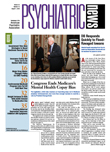Congress passed landmark mental health legislation on July 9 that will provide equal coverage for outpatient psychiatric care as for other types of care for the first time for the 44 million Medicare beneficiaries. Although President Bush vetoed the measure a week after it passed, Congress overrode the veto the same day.
The legislation also includes provisions that will affect health care delivery, including replacing a planned 10.6 percent cut in physician reimbursements with a small increase (see Threatened Medicare Cut Turns Into Slight Boost).
The Medicare Improvements for Patients and Providers Act (HR 6331) also will expand Medicare beneficiaries' access to needed psychiatric medications.
“This legislation will put an end to a system that forces medically vulnerable patients, including psychiatric patients, to pay two-and-one-half times more out-of-pocket costs for mental health services than for any other service under Medicare Part B,” said APA President Nada Stotland, M.D., M.P.H., in a written statement.
“We could not have arrived at this extraordinary moment without the coordinated efforts of our dedicated members, our devoted and skilled staff, and the efforts of those legislators who were unwilling to tolerate this unacceptable discrimination,” she told Psychiatric News.
The measure, which passed with veto-proof majorities in both chambers of Congress, was vetoed by Bush because, in part, it cut payments to Medicare Advantage plans, which he favors because they were designed to cost beneficiaries less than traditional fee-for-service Medicare.
The measure will phase out over six years the 50 percent coinsurance payment beneficiaries face for outpatient mental health services. This discriminatory copay requirement has been in effect since Medicare was established in 1965. Medicare requires beneficiaries to pay only 20 percent of the cost of outpatient services for problems not classified as related to the treatment of most mental disorders.
The copay disparity between mental health and other types of medical care has resulted in undertreatment of mental illness among the Medicare population, which includes some demographic groups that have the highest suicide rates in the nation, according to mental health advocates.
Research indicating high rates of mental illness among the Medicare population included a 2006 study by researchers at George Washington University that found that 26 percent have mental disorders, while only 21 percent of the general population has such conditions. The researchers found that among the other population that Medicare serves—people with disabilities—nearly 60 percent have a mental disorder, and 37 percent have “severe” mental illness.
“Elderly people are particularly vulnerable with respect to depression, anxiety, and alcohol use problems, each of which can be treated on an outpatient basis,” said Ron Manderscheid, M.D., an adjunct professor in the Department of Mental Health at Johns Hopkins University, in congressional testimony in March.
Proponents of the change also point out that Medicare's long-time requirement for only a 20 percent copay for inpatient mental health care has also led Medicare beneficiaries to overutilize those services, because the copay makes them more affordable than outpatient care.
A 2002 analysis by the Substance Abuse and Mental Health Services Administration of Medicare and Medicaid—the latter does not charge proportionally more for outpatient mental health care—found that Medicare beneficiaries are much more likely than Medicaid beneficiaries to receive costly inpatient mental health and substance abuse care, if they receive any such services. This has resulted in higher annual costs per beneficiary for inpatient mental health care and substance abuse treatment in Medicare than Medicaid.
The new law also requires coverage of benzodiazepines and barbiturates under Medicare Part D, a change that goes into effect in 2013. The federal prescription drug program excluded benzodiazepines when it was launched in 2006 due to concerns that it would expand the misuse of the medication in an attempt to sedate nursing-home residents.
Statutory protections for certain classes of medications—including ant idepressants and antipsychotics—under the new law will ensure that medically vulnerable patients will have access to “all or substantially all” such medications under Part D.
“This fixes significant problems in the Medicare program. This bill will allow patients easier access to psychiatrists and treatments that can relieve suffering and help patients live more fulfilling and productive lives,” Stotland said. “This bill is consequential and far reaching.”
APA and other physician groups, including the AMA, joined with AARP and other advocacy groups to push strongly for final approval of the measure.
“Along with the AMA, many patient, physician, and military groups called on Congress to pass this bipartisan bill,” said Nancy Nielsen, M.D., president of the AMA, in a statement shortly after Congress overrode the veto. “The only group opposing the bill was the health insurance lobby, which was eager to protect health plan subsidies and profits.”
The text of the Medicare Improvements for Patients and Providers Act can be accessed at<http://thomas.loc.gov> by searching on the bill number, HR 6331. ▪
